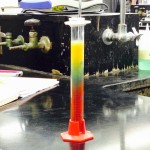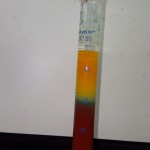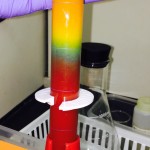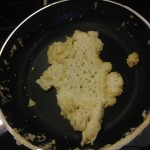Lab Procedures and Safety
General Lab Procedures and Conduct and Lab Safety Agreement
“PPE Lab Experiences Worth Sharing” from Flinn Scientific
“Why You Need to Wear Safety Glasses” (from Periodic Videos)
Runaway Hot Plates – it really happens!
A Visual Guide to Chemistry Glassware (from Compound Interest)
Chem 12B Lab Equipment Check Sheet
Microwave Assisted Organic Reactions
Lab Experiments
Lab 0. Organic Chemistry Lab Techniques
New Reflux Equipment with air cooled condenser (findenser) and heat on inserts
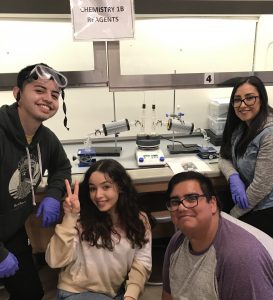
Lab 1. Moonshine: Ethanol from Fermentation
Lab 2. What a Pain! Acetaminophen to Phenacetin
Structure Characterization: IR, NMR, and MS
Lab 3. Solar Cell Using Plant Pigments
Tomato Juice Rainbow article (J. Chem. Educ., 1986, 63, 1092-1094)
Lab 4a. Ring Around: Aromaticity and Aromatic Side Chain Reactions
Lab 4b. Ring Around: Electrophilic Aromatic Substitution Reactions
Lab 4c. Ring Around: Bromination of Acetanilide
Lab 4d. Ring Around: Nitration of Salicylic Acid
Lab 5a. Making Big from Small: Grignard(-like) Reaction
Lab 5b. The Most Practiced Reaction in the World! Maillard Reaction
Lab 6. Acids and Acid Derivatives Reactions
Lab 7. Making Big from Small 2: Aldol Condensation
Lab 8. Multistep Synthesis of a Sunscreen
Lab C. Gas Chromatography and Liquid Chromatography
Why Lab?
In science, observations are made to discover, learn, and understand what’s going on in nature. In science courses, hands-on activities are the best way to make observations and learn science. As such, the laboratory is a very important part of this course. In Chem 12B lab, experiments demonstrate and elucidate concepts discussed in lecture. You will synthesize, separate, isolate and characterize organic compounds using organic chemistry microscale lab techniques. You will also gain an awareness of organic substances. Although many organic substances pose safety concerns, e.g., flammability, toxicity, mutagenicity, carcinogenicity, the Organic Chemistry lab is a safe environment as long as you are aware of the nature of these substances and their proper use and handling.
Science is a collaborative endeavor. Employers value employees who know how to work as a team. You will work in a group of 2 in lab. Make sure each team member contributes equally to each experiment. However, each student is responsible for doing each lab assignment individually. Expect to spend the entire lab period in lab.
Lab Grade
Your Lab Grade consists of the following assignments:
15 Lab Activities
Lab Activities are designed for you to apply and practice the objectives discussed in lecture to lab and to to develop skills in collecting data, analyzing data to obtain results, and interpret your results to draw conclusions.
I encourage you to work with your lab partner or other Chem 12B students on these Lab Activities but you must submit each Lab Activity individually due at the end of Wednesday’s lab.
Lab Safety Factor
The Lab Safety Factor will be determined by your lab instructor at the end of the semester. It will be based on your attendance (including being on time), your timely submission of lab assignments, your observation of lab safety rules and regulations including Lab Patrol, your lab technique, and your initiative and cooperation (ability to do your own work and an equal share of group work, ability and willingness to work, collaborate, and cooperate with other students). If you arrive late; hand assignments in late; do not observe lab safety, e.g., don’t use eye protection, endanger the safety of your peers and instructor; have poor lab technique, or no one likes working with you, you will receive a low lab safety factor grade and a lower lab grade.
Lab Policies
1. Safety glasses or goggles are required in lab. For students who wear contact lenses, you will need to wear safety glasses/goggles over your contact lenses. Try to be aware of your safety as well as the safety of others in lab.
2. FAILURE TO CHECK-IN YOUR LOCKER, whether you drop the course or complete it, results in a $25 LAB FEE plus a charge for any broken or missing equipment.
3. ALL LABS MUST BE PERFORMED TO PASS THIS COURSE.
4. Late lab assignments will be penalized 5% per calendar day.
5. The chemistry lab has 14 computers.
a. You cannot store your lab data and results on the hard drive of a computer you are using. Please bring a flash/thumb drive to store lab files.
b. Each computer is connected to a network printer. You will need to supply your own printer paper.
c. These computers are connected to the internet so you can look up scientific information. Please do not download images, files, or software onto these computers.
